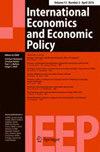Did the great influenza of 1918–1920 trigger a reversal of the first era of globalization?*
IF 1.5
Q2 ECONOMICS
引用次数: 3
Abstract
I revisit the 1918–20 pandemic and ask whether it led to a reversal in the rise of trade and financial globalization that preceded it. Using annual data for 17 countries for the 1870–1928 period, a variety of tests and techniques are used to draw some robust conclusions. Overall, the pandemic a century ago interrupted, but did not put an end, to the first globalization of the twentieth century. However, two blocs consisting of combatant and non-combatant countries, experienced significantly different consequences. Globalization was sharply curtailed for the combatant countries while there were few, if any, consequences for globalization in the non-combatant group of countries. That said, there was considerable resilience especially in trade openness among several of the combatant economies. Perhaps changes in the make-up of economic blocs, post-pandemic, is a fallout from shocks of this kind. While there are lessons for the ongoing COVID pandemics differences between the 1920s and today also play a role.1918年至1920年的大流感是否引发了第一个全球化时代的逆转*
我回顾了1918年至1920年的大流行,并询问它是否导致了之前贸易和金融全球化兴起的逆转。利用1870-1928年期间17个国家的年度数据,采用各种测试和技术得出了一些可靠的结论。总的来说,一个世纪前的大流行病中断了,但没有结束二十世纪的第一次全球化。然而,由战斗国家和非战斗国家组成的两个集团经历了明显不同的后果。全球化对参战国家的影响急剧减少,而对非战斗国家集团的全球化的影响很少,如果有的话。话虽如此,几个受打击的经济体在贸易开放方面表现出相当大的韧性。也许大流行后经济集团构成的变化是这种冲击的后果。虽然正在进行的COVID大流行有一些教训,但20世纪20年代和今天之间的差异也发挥了作用。
本文章由计算机程序翻译,如有差异,请以英文原文为准。
求助全文
约1分钟内获得全文
求助全文
来源期刊

INTERNATIONAL ECONOMICS AND ECONOMIC POLICY
ECONOMICS-
CiteScore
3.50
自引率
0.00%
发文量
24
期刊介绍:
The double-blind peer reviewed Journal International Economics and Economic Policy publishes empirical and theoretical contributions, especially papers which are relevant for economic policy. The main focus of the journal is on comparative economic policy, international political economy, including international organizations and policy cooperation, monetary and real/technological dynamics in open economies, globalization and regional integration, trade, migration, international investment, internet commerce and regulation.IEEP particularly offers contributions from the policy community and provides a forum for exchange for the academic and policy community. Officially cited as: Int Econ Econ Policy
 求助内容:
求助内容: 应助结果提醒方式:
应助结果提醒方式:


